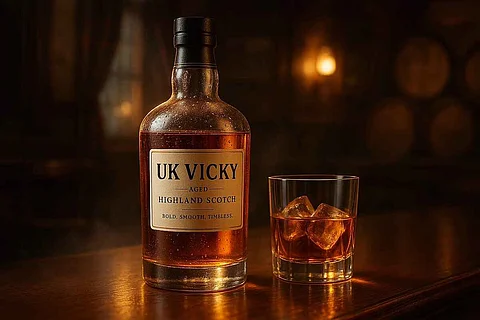
- Home
- NewsGram USA
- India
- न्यूजग्राम
- World
- Politics
- Opinion
- Entertainment
- On Ground
- Culture
- Lifestyle
- Economy
- Sports
- Sp. Coverage
- Misc.
- NewsGram Exclusive
- Jobs / Internships
- Interview

During PM Modi’s UK visit, India and Britain finalized a major FTA aimed at doubling bilateral trade to $120 billion by 2030
The FTA includes a phased reduction of Scotch whisky import duties from 150% to 40%
Beyond trade, the visit focused on deepening ties in defence, energy, health, education, and digital sectors
Prime Minister Narendra Modi is in the United Kingdom this week for a landmark diplomatic and economic mission, one that is set to transform the trajectory of India–UK relations and make Scotch whisky more affordable for millions of Indian consumers.
This marks Prime Minister Modi’s fourth visit to the UK since taking office in 2014, and it comes at a pivotal time. Accompanied by Trade Minister Piyush Goyal, Modi will engage in high-level discussions with British Prime Minister Keir Starmer to finalize a historic India–UK Free Trade Agreement (FTA).
Beyond trade, the two leaders are expected to delve into strategic areas including energy cooperation, defence, health, education, and digital technology. Modi will also meet with top business leaders from both nations to explore investment opportunities and economic collaboration.
India’s Foreign Secretary Vikram Misri described the visit as “significant,” confirming that legal vetting of the agreement is nearly complete. The pact is expected to be signed during Modi’s four-day tour, with implementation likely within the next 9 to 15 months, pending approval from India’s federal cabinet and the British Parliament.
The India–UK Free Trade Agreement: A Game-Changer
The India–UK FTA, concluded in May after three years of on-and-off negotiations, aims to double bilateral trade from $60 billion to $120 billion by 2030. It removes key barriers and opens up reciprocal access to two of the world’s largest consumer markets.
Key highlights of the agreement include:
99% of Indian exports to the UK will enjoy zero-duty access, benefiting sectors such as textiles, footwear, gems and jewellery, marine goods, and engineering products.
In return, India will ease tariffs on 90% of UK exports, especially in premium sectors like whisky, cars, pharmaceuticals, chocolates, and advanced machinery.
Tariffs on British cars will be slashed from over 100% to 10%, under a quota system that will be liberalized over time.
Liberalized services trade will allow Indian professionals—such as IT workers, chefs, yoga instructors, musicians, and architects—greater access to the UK market.
A new clause exempts Indian professionals posted to the UK from social security payments for up to three years—saving them thousands of pounds annually.
Enhanced support for SMEs, simplified customs, and digital trade facilitation are also included.
However, the most headline-grabbing change for Indian consumers lies in a single, long-guarded product: Scotch whisky.
Why This Visit Will Make Scotch Whisky Cheaper in India
Under the new Free Trade Agreement (FTA), India agreed to cut import duties on Scotch whisky from 150% to 75% right away, with a further reduction to 40% over the next ten years. This marks India’s biggest tariff cut for imported alcohol. Although India has been the largest market for Scotch whisky by value, high taxes kept its sales volume low—just 3% of global Scotch sales. This deal is expected to change that.
The Scotch Whisky Association projected a £1 billion boost in exports over five years and 1,200 new jobs in the UK. India’s central and state governments could earn over £3 billion more in yearly revenue. In 2024 alone, India imported 192 million bottles of Scotch, a huge jump from ten years ago. Still, the high price kept it out of reach for most Indian drinkers—until now.
With lower taxes, even basic Scotch whiskies will become more affordable, competing directly with top Indian brands. India’s whisky market has grown rapidly, shifting from molasses-based spirits to high-quality grain and malt whiskies. Some local brands like Amrut and Indri-Trini have won US-based Whiskies of the World Awards 2024. Yet Scotch continues to lead the premium segment with its rich taste and traditional ageing process.
Experts believe Indian companies may start blending imported Scotch into their own products to improve quality and stay competitive. The biggest impact will likely be in premium aged Scotch whiskies, which may see significant price drops and become more accessible to Indian consumers.
Though the UK celebrates the deal, local distillers are ready to defend their turf. The whisky market in India is expected to grow, but competition will be tougher than ever.
Prime Minister Modi’s UK visit marked more than diplomacy—it opened the door to a major trade shift. For Indian consumers, it’s a win: premium Scotch whiskies may finally be within easy reach. [Rh/VP]
